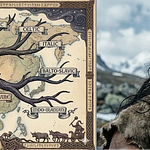For the first time ever, parents going through IVF can use whole genome sequencing to screen their embryos for hundreds of conditions. Harness the power of genetics to keep your family safe, with Orchid. Check them out at orchidhealth.com.
On this episode of Unsupervised Learning Razib welcomes back paleoanthropologist Chris Stringer. Affiliated with the Natural History Museum in London, Stringer is the author of African Exodus. The Origins of Modern Humanity, Lone Survivors: How We Came to Be the Only Humans on Earth and Homo Britannicus - The Incredible Story of Human Life in Britain. A proponent since the 1970’s of the recent African origin of modern humans, he has also for decades been at the center of debates around our species’ relationship to Neanderthals. In the 1980’s, with the rise to prominence of the molecular model of “mtDNA Eve,” Stringer came to the fore as a paleoanthropological voice lending support to the genetic insights that pointed to our African origins. Trained as an anatomist, Stringer asserted that the fossil evidence was in alignment with the mtDNA phylogenies, a contention that has been broadly confirmed over the last five decades.
But in 2010, Stringer and other proponents of an “out of Africa” “with replacement” model of recent human origins began to modify their views in response to the mounting evidence of archaic admixture, the introgression of Neanderthal and Denisovan genes into the modern human genome. On this episode, Razib queries Stringer on the state of human evolution from the fossil’s-eye view in 2024. They discuss “Dragon Man,” and whether this is just a fossil of one of the Denisovan populations. Razib also presss Stringer about the diversity of human species in Southeast Asia, and just how many Denisovan populations or “races” might have existed. They also touch on Homo naledi, and the ensuing controversies around naledi-related publications. Razib seeks Stringer’s opinion on different models of African origins for our lineage, from extensive archaic admixture to “African multi-regionalism.” On a more speculative note, they mull over the possibilities for complex societies in the Pleistocene in light of the finds at Göbekli Tepe. With Stinger’s over five decades in the discipline, very few rival his qualifications or capability to provide a bird’s-eye view of where we are in understanding human evolution in 2024.












